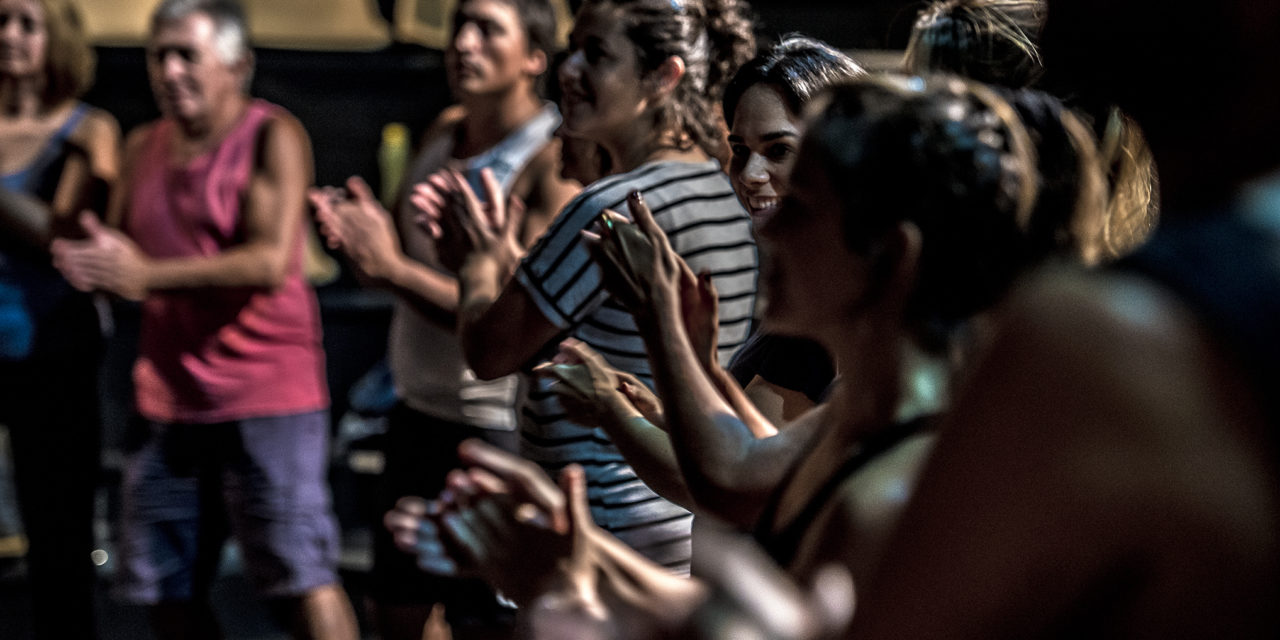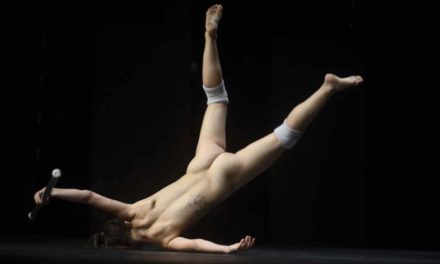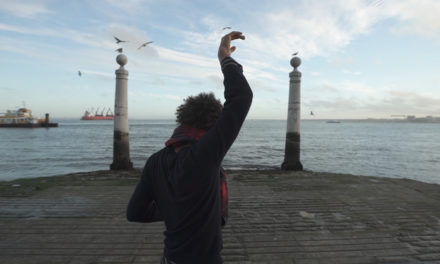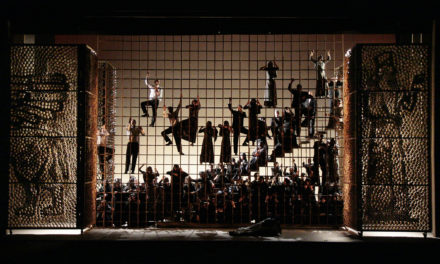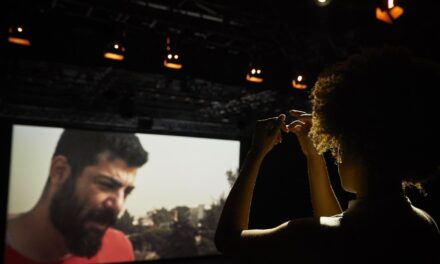From February 20th to 24th this year, I had the opportunity, along with Fernando Yamamoto and Paula Queiroz, fellow members of the Brazilian theatre group Clowns de Shakespeare, to give a workshop to the actors of the Institution Teatral El Galpón, at its theatre located in the city of Montevideo, Uruguay. This workshop marked the beginning of the creative process of Fútbol a gol y sobras, a coproduction of the two theatrical collectives made possible by the Ibero-American Performing Arts Assistance Fund – Iberescena.
The initial contact between the two groups, when the idea of the current coproduction first appeared, began at the time of the presentation of Sua incelença, Ricardo III by the Clowns de Shakespeare, in the programming of Montevideo Capital Iberoamericana de la Cultura in 2013. At that time, we contacted El Galpón to get to know them and their theatre, because of the group’s importance in Latin America and worldwide, mainly due to its political action against the Uruguayan civil-military dictatorship (which caused the group exile in Mexico). At that time, we invited the members of El Galpón to watch our play that was being presented in the city, and from then on, the desire to work together someday was born.
In this mixed team, the Brazilian side is composed of Fernando Yamamoto (director), myself (assistant director), Paula Queiroz (cast coach) and Ernani Maletta (musical director). The Uruguayan side of the team, in turn, features the dramaturgy of Federico Guerra, the production of El Galpón and its cast.
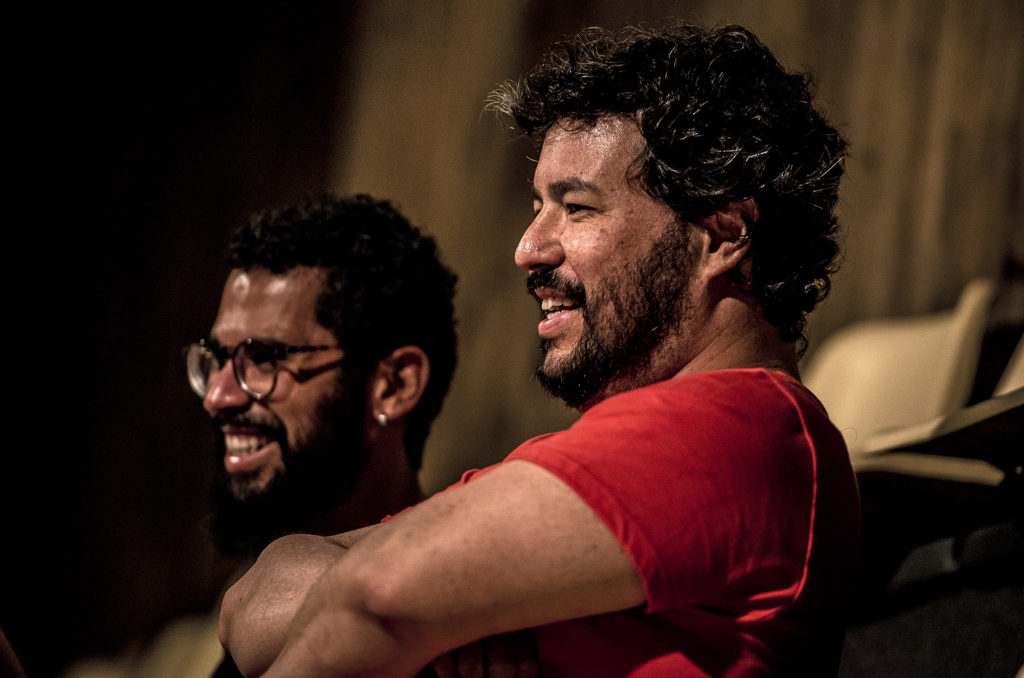
Diogo Spinelli and Fernando Yamamoto. Photo credit: Alejandro Persichetti.
Although the final cast consists of only nine actors and actresses, it was fundamental to work with 22 actors and actresses in our workshop (nineteen members of the group and three invited actors). It allowed us to get to know El Galpón and its diversity more deeply, with its cast of actors and actresses that belong to different generations, but who still are part of a whole in certain aspects. This differentiates them from the Brazilian actors and actresses – at least, from the Brazilian actors and actresses with whom we’re used to working with. Thus, for both parts, the workshop was a space of socialization, in which we began to understand our differences and similarities, inside and outside the field and the stage. Beyond the language, what cultural traits differentiate us as Brazilians and Uruguayans? At the same time, what are the factors that unite us as Latin Americans? The possibility of cultural exchange that is intrinsic to this creative process is, from the start, undoubtedly, one of its greatest virtues; and this factor will definitely be reflected somehow in the final staging.
This process of knowledge began in our workshop from its first day, in which the presentations of individual scenes were held. The actors and actresses from El Galpón presented solo scenes of up to three minutes based on their personal relationships with the theme of football. Whether in Brazil or Uruguay, football is present and affects everyone’s lives, since even the fact of not enjoying the sport or not supporting a team (as in my case) becomes a determining identity factor. The option of starting a workshop with the presentation of scenes prepared previously and individually by the actors based on a given prompt has been constant in our pedagogical work, as we believe that this procedure helps us to get more directly in touch with the aesthetic choices, the articulations between the different components of the scene (such as the use of light, music, costumes, etc.), the speech produced and the scenic potentialities of each actor.
Throughout the week, besides polyphonic exercises – a term used by Maletta for exercises in which the actors have multiple focuses of attention, and which commonly involve a pulse and a collective listening – other exercises were carried out to stimulate the scenic and dramaturgic writing of the actors. This was also a way of presenting methodological possibilities for a dramaturgical writing that occurs during the creative process, in a more collaborative way. This procedure, which is not so usual in the productions of the Uruguayan group, may be adopted in Fútbol a gol y sobras. Thus, the dramaturgies created by the cast during the rehearsals should be absorbed in the play’s final text signed by Federico Guerra, as much as literary references to authors who wrote about football – such as the Brazilians Luís Fernando Veríssimo and Nelson Rodrigues and the British Nick Hornby.
Outside El Galpón’s stages, we also began to breathe a little more of Montevideo’s atmosphere: by watching Peñarol’s massive victory against the Wanderers at Estádio Parque Alfredo Víctor Viera, by enchanting ourselves with the Murgas’ performances of the Uruguayan carnival in Montevideo’s Velodrome (a scenic-musical manifestation that deserves an article in The Theatre Times), or even by reading about the cancellation of the match between Nacional and River Plate, after a Nacional supporter had injured an employee of the stadium where the match occurred, in a demonstration of the increase of violence in the football stadiums. A trend that was pointed out to us by all the reporters to whom we gave interviews in Montevideo.
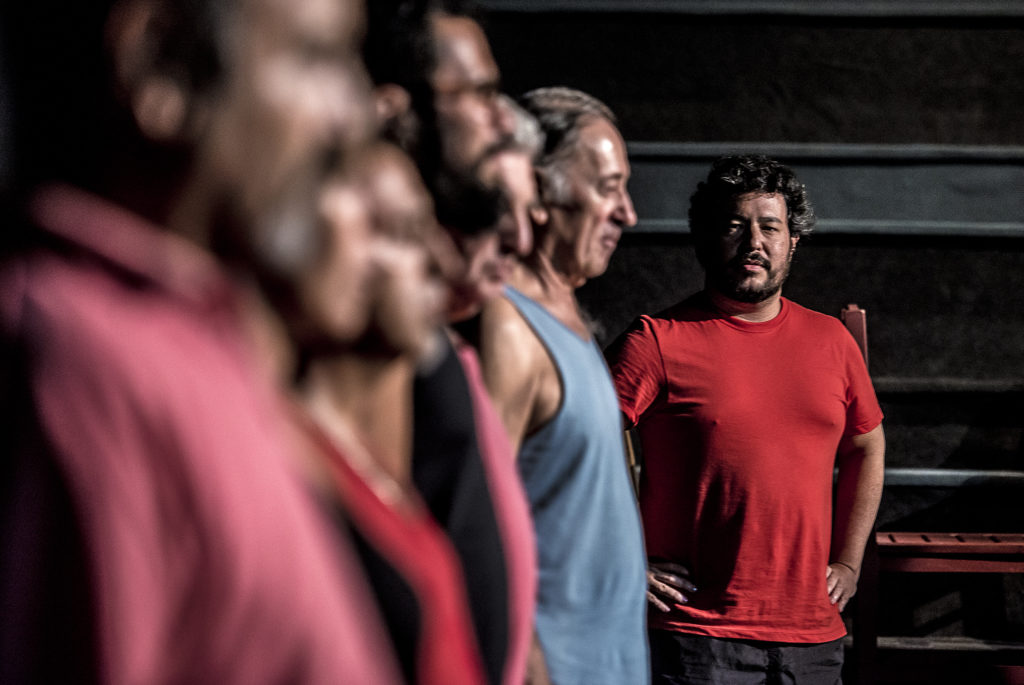
The cast of El Galpon and Brazilian director Fernando Yamamoto. Photo credit: Alejandro Persichetti.
And that was just the beginning of the match. In June, the Brazilian part of the team will return to the home of the Uruguayan hosts to begin the period of daily rehearsals that we will bring to the field in Fútbol a gol y sobras. Happy coincidences guided the project’s execution schedule. The first of them concerns a preview of the work on September 2nd , El Galpón’s 68th anniversary (El Galpón is the oldest theatre group still in action in Latin America); And the second concerns the opening itself, scheduled to take place during the fifth edition of FIDAE – International Festival of Performing Arts, a biennial festival organized by the Ministry of Education and Culture, through the Uruguayan government’s National Culture Directorate. Both dates still need to be confirmed.
As the Uruguayans would say: Vamo’arriba!
This post was written by the author in their personal capacity.The opinions expressed in this article are the author’s own and do not reflect the view of The Theatre Times, their staff or collaborators.
This post was written by Diogo Spinelli.
The views expressed here belong to the author and do not necessarily reflect our views and opinions.

